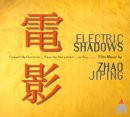
Electric Shadows: Film Music by Zhao Jiping
Wea/Atlantic/Teldec

reviewed by Christopher Coleman
for RTHK Radio 4
Band 4: fade in (quickly) 6:12?8:35 fade out
Our first example, Spirit of the Peacock from the film Sunbird, exemplifies the film music of Zhao Jiping on this disc entitled Electric Shadows. A tasteful fusion of Chinese folk and Hollywood Golden Age movie music, flavored with occasional touches of Chinese opera; this is music that will be familiar to and likely loved by many in Hong Kong. This Teldec disc contains music from the favourites Farewell My Concubine and Raise the Red Lantern as well as four other films. It is clear from this compilation that Zhao Jiping is a master of his craft: this highly evocative music scarcely needs visual imagery to summon up the scenes it portrays.
Band 1: beginning to fade out quickly at 1:22
Rhythmic and colorful, with great attention to gorgeous sonorities, this is fine film music indeed. As is the case with most of the best film scores, the weaknesses of this music are related to the genre. Zhao writes very effective five minute spans of music, seldom does a movie to go for more than that length of time focusing on the music. Consequentially, pieces rarely have a chance to develop their material in any significant way at all. By necessity even the best film music is usually about statement; and symphonic rhetoric or development is impossible. Some of the material seems to practically cry out for development but get only repetition. Here is a stunning extract from Red Firecracker, Green Firecracker. We hear it repeatedly, and it is indeed lovely, but it is practically the same each time.
Band 8: 6:14 to band 9 fade out at 0:55
Furthermore, once a film composer does something well, they become prisoners of their own success, and they are asked to do the same thing repeatedly. With the sole exception of the music to Raise the Red Lantern, these pieces are very much alike. There is a clear Zhao style, with slow moving, rich string chords in parallel motion at the core of it, and we hear this repeatedly. Another problem with the genre lies in the fact that this art form is not intended to be presented independently. Film music is meant to be experienced with visual images, and it is therefore often simpler than music created to be the sole artefact of the audience's attention. Here this is manifested in the slow pace of harmonic change and the absence of counterpoint in a great many of the works. However, this works in Zhao's favor, as these are characteristics of traditional Chinese music as well--Chinese music is primarily melodic rather than harmonic or contrapuntal.
Nonetheless, this is beautiful music in bite-sized pieces, and is superbly performed by the China Symphony Orchestra and Chorus directed by Hu Bing Shu. Intonation is impeccable, timbres full, and the dynamic balance between western and Chinese instruments, often so difficult to achieve, is perfect. The disc is a very full 77 minutes worth of music and comes with an informative and well-written programme booklet and several beautifully printed photographs from the movies. All in all, this is a very nice product indeed. Let's close with the most unusual piece on the disc, Fate from Raise the Red Lantern.
Band 12: beginning --fade out by 1:45
Return to Music Criticism and Commentary